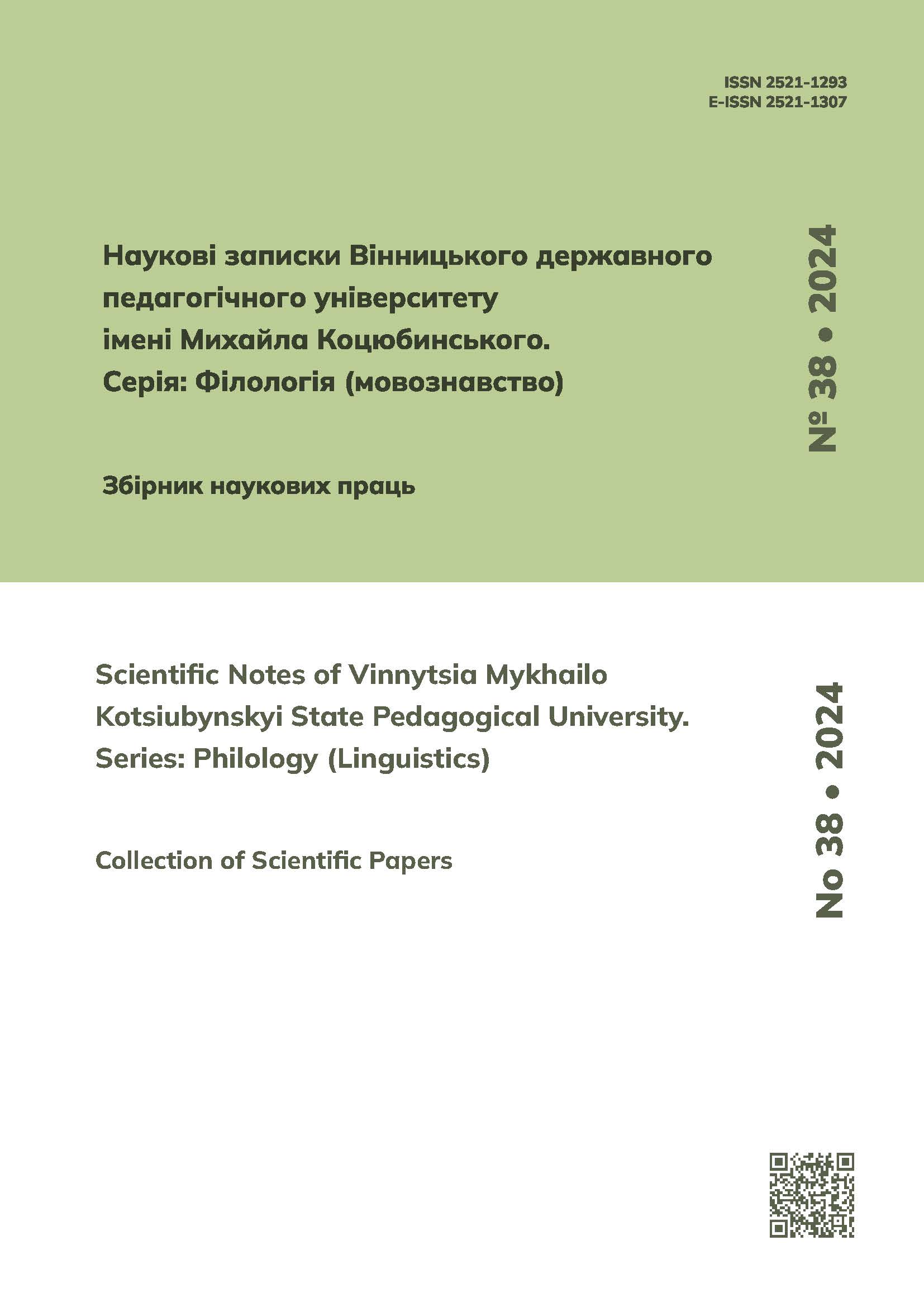The concept of "Europe" in Ukrainian public discourse at the end of the first quarter of the 21st century
https://doi.org/10.31652/2521-1307-2024-38-03Published 2024-08-14
Keywords
- concept, Europe, conceptual feature, verbal explication, public discourse, mass media
Copyright (c) 2024 Olha Pavlushenko

This work is licensed under a Creative Commons Attribution 4.0 International License.
How to Cite
Abstract
The article analyzes the conceptual features of the European phenomenon that formed in Ukrainian public discourse at the end of the first quarter of the 21st century. The purpose of the article is to determine the content of the concept of "Europe" that was in Ukrainian public discourse at the end of the first quarter of the 21st century, when the civilizational choice of Ukrainians received a new impetus for realization through the decision of the European Council to begin negotiations on Ukraine's accession to the European Union. The main research method is conceptual analysis, which involves studying various substrate mental units – representations, scenarios, and gestalts associated with the phenomenon of Europe in the collective consciousness of Ukrainian society. Additionally, the method of discourse analysis is applied at the stage of processing the mass media objectification of the concept of "Europe". Results. The following conceptual features have been identified: Europe as a space for the comprehensive realization of the individual; well-being and freedom as fundamental civilizational principles aspired to by Ukrainian society; democracy built on the rule of law and respect for individuals; partnership relations among all states and nations without domination by the stronger; unity of diverse cultures; civilizational choice for progress into the future; an influencing factor on Ukraine; a state of crisis associated with the weaknesses of liberal democracy on the one hand, and the dominance of consumer interests in European societies on the other; and the vulnerability of the political system to hybrid expansion by totalitarian and autocratic regimes. Conclusion. The analysis of the verbal explication of the conceptual features of the phenomenon of Europe in Ukrainian public discourse leads to the conclusion that the content of the studied linguistic construct in the collective consciousness of Ukrainians at the end of the first quarter of the 21st century is formed by the following main frames: institutional Eurocentrism with the system-forming role of the European Union, civilizational values, socio-cultural unity of diversity, production culture, and Eurointegration aspirations as a path to the future.
Downloads
References
- Вакулович, Л. Л. (2022). Особливості мовного втілення лексеми Європа та слів з компонентом Євро. Закарпатські філологічні студії. Ужгород: Вид. дім «Гельветика», Вип. 26, т. 1. С. 32-37. https://doi.org/10.32782/tps2663-4880/2022.26.1.5 DOI: https://doi.org/10.32782/tps2663-4880/2022.26.1.5
- Гоцур, О. (2016). Репрезентація та роз’ясненння концептів «Європа» та «росія» на сторінках української преси. Вісник Львівського університету. Серія Журналістика, Вип. 41. С. 111–117.
- Донська, А. Г. (2012). Політика як основа формування концепту Європи. Філософія і політологія в контексті сучасної культури. Вип. 4 (3) https://fip.dp.ua/index.php/FIP/article/view/131
- Завальнюк, І. (2023). Синтаксичні одиниці в мові вітчизняних масмедіа періоду російсько-української війни: оновлення змісту й структури. Наукові записки Вінницького державного педагогічного університету імені Михайла Коцюбинського. Серія: Філологія (мовознавство), Вип. 37, С. 120-130. https://doi.org/10.31652/2521-1307-2023-37-120-130 DOI: https://doi.org/10.31652/2521-1307-2023-37-120-130
- Зайцев, М. (2014). Європа як концепт. Науковий вісник Східноєвропейського національного університету імені Лесі Українки, Вип. 16, С. 45-51.
- Мартинов, А. Ю. (2009). Європейський союз. Енциклопедія Сучасної України / Редкол. : І. М. Дзюба, А. І. Жуковський, М. Г. Железняк [та ін.) ; НАН України, НТШ. Київ : Інститут енциклопедичних досліджень НАН України. https://esu.com.ua/article-17376
- Павлушенко, О. & Мазай, Л. (2021). Концепт «нація» в мовній свідомості української молоді через призму асоціативного експерименту. Наукові записки Вінницького державного педагогічного університету імені Михайла Коцюбинського. Серія: Філологія (мовознавство), Вінниця: ТОВ «фірма "Планер"», Вип. 33, С. 114-123. https://doi.org/10.31652/2521-1307-2021-33-114-122 DOI: https://doi.org/10.31652/2521-1307-2021-33-114-122
- Павлушенко, О. & Мазай, Л. (2022). Персуазивність політичної промови як інструмент боротьби за міжнародну безпеку. Наукові записки Вінницького державного педагогічного університету імені Михайла Коцюбинського. Серія: Філологія (мовознавство), Вінниця: ТОВ «Фірма Планер», Вип. 34, С. 51-59. https://doi.org/10.31652/2521-1307-2022-34-51-59 DOI: https://doi.org/10.31652/2521-1307-2022-34-51-59
- Попович-Кузнецова, Н. В. (2009). Європа. Енциклопедія Сучасної України / Редкол. : І. М. Дзюба, А. І. Жуковський, М. Г. Железняк [та ін.) ; НАН України, НТШ. Київ: Інститут енциклопедичних досліджень НАН України. https://esu.com.ua/article-17368
- Прихода, Я. (2007). Європа в публіцистичних текстах Івана Франка. Вісник Львівського ун-ту. Серія журналістика, Вип. 30, С. 142-147.
- Прихода, Я. В. (2005). Концепт Європа в українській публіцистиці: конітивно-лінгвістичні аспекти: автореф. дис. … канд. філол. наук : 10.01.08, Львів, 16 с.
- СУМ 2017 – Словник української мови: у 3-х т. Т. 2. Д–Й / Редактори: акад. С. Єфремов, А. Ніколаєвський. Упорякував: Б. Грінченко, Київ: Видавничий дім Дмитра Бураго, 2.XXIV, 440 с. Репринт з видання 1927 р. (Серія «Словникова спадщина України»).
- Яворська, Г., Богомолов, О. (2010). Непевний об’єкт бажання: ЄВРОПА в українському політичному дискурсі: монографія, Київ, 136 с.
- Яроцька, Г. & Пономаренко, Т. (2020). Метафоричне моделювання концепту Європа в українському медіадискурсі. Діалог. Медіастудії, Вип. 26, С. 208-225. https://doi.org/10.18524/2308-3255.2020.26.225322 DOI: https://doi.org/10.18524/2308-3255.2020.26.225322





